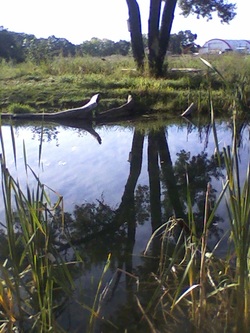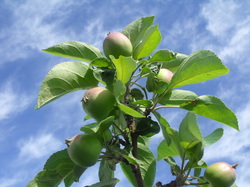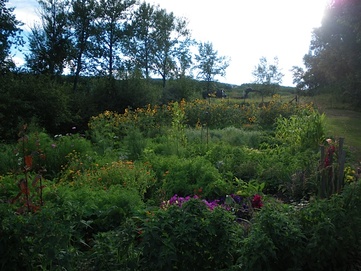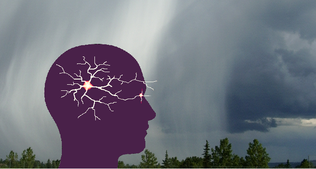“Nature's Geometries are pleasing to the eye and human spirit.” ~ Unknown  We often return from an outing in the wilderness with a profound sense of peace—a feeling of healing or revitalization. After a hike in the woods, or a canoe trip, we frequently hear comments such as “I feel so refreshed and rejuvenated”. Even sitting out on the porch and taking in a mid-summer downpour can be an insightfully comforting and moving experience. Is this phenomenon merely the result of fresh air and less urban clatter, or are there deeper forces at work? With respect to this, a relatively new field has been quietly evolving over the last couple of decades fittingly called Ecopsychology. It proposes that the root cause of many psychological disorders is born out of our isolation from nature. It also advances theories that time spent in a natural environment not only nourishes mental health, but actually enhances our sensory-motor skills and cognitive abilities. Now when we think of Permaculture, the basic necessities of life come to mind. However, once the need for food, shelter, and clothing, etc. can be fulfilled in an adequate and consistent manner, the next level of essentials in the hierarchy of human needs such as personal development, entertainment, compassion, education, spiritual attainment and more come into focus. The term “Permaculture” originated by combining the two words ‘permanent’ and ‘agriculture’ for the simple reasons it had its beginnings strongly focused around the sustainable, regenerative production of food and other agricultural products. However, the principles of the field worked so well that it has grown to encompass many other areas of home life and the community, thus inspiring the broader meaning found in combining the words ‘permanent’ and ‘culture’. The purpose of this paper is to explore how Permaculture might offer a complimentary and highly beneficial partnership when thoughtfully applied in the comparatively new and innovative field of Ecopsychology.  In 2011 Statistics Canada estimated that the percentage of Canadians living in urban centres was at approximately 81%. The proportions may vary somewhat from one first-world country to another, but overall it’s safe to say the vast majority of western life is now centred within urban areas. We are all too familiar with what the typical civilian lifestyle might entail: sitting in traffic for extended periods, working in an enclosed space such as a factory or office, heading home in high-traffic volumes, visiting an enclosed grocery store, bank, or department store, and maybe spending a few hours in front of the T.V. or computer at home. It is evident that we are spending less and less time with any meaningful link to the natural world.  As mentioned, Ecopsychology theorizes that many mental disorders are manifest through separation from a natural environment for extended periods. Though a variety of reasons for this have been proposed, it is nonetheless easy for one to imagine how spending hours in an unnatural setting such as an office or factory could inspire some adverse mental health conditions, if not at least a fair degree of stress and an unfavourable mood. Consider the lack of stimuli in an office space for instance—blank walls or cubicles, monotone colours, straight lines, few smells other than a copier or some toner residue; the monotonous sounds of machinery, constant typing and phones ringing—everything in repetition. Compare this to a natural setting, with unpredictable lines and shapes, an infinite variety of colours and textures and scents that change with every footstep and temperature gradient; the sound of dozens of birds and other wildlife and the pleasant melody of water trickling in the distance—the list is endless. To be suddenly thrown into a situation where none of this existed should only be devastating to our senses and to our minds. According to Ecopsychology, we are instinctively drawn to a natural environment, as that is what we have spent hundreds of millennia adapting to. By the same token, Permaculture provides us a way of thoughtfully designing living spaces while considering how to best integrate human lives with our natural environment. It observes what Mother Earth can provide us directly with respect to our living needs, while allowing us the opportunity to study nature first-hand, both when conceiving ideas for designing our homes, and while actively living in the permacultured space itself.
 to fertilization is realized via natural methods learned from examining the ecosystem directly. Some very important feats are accomplished here, beyond actively participating in the production of our own food. To begin with, there will no longer be any need to venture across town in search of soil additives, and chemicals, etc. As well, we lessen any concern about high water bills and everything that goes with the dependency on the municipal water grid—including shortages. Because we have taken an interest in our own food production, we are not only allowing ourselves more time to be immersed in a natural setting (in this case the landscape), but we are actually observing and learning about nature’s processes first-hand instead of allowing a complex industrial solution to perform the work for us. Psychologically, this is bound to have an exceptional impact. In the grocery store setting we are prone to seeing ourselves as virtually separate from nature (not knowing where our food originated and not witnessing it growing). In the home-production setting, however, we not only witness the food as it materializes first-hand, but we are actively participating in its creation with the knowledge it will soon nourish our physical bodies. When this occurs, one is able to make a connection to nature on a very intrinsic and profound level, increasing one’s mindfulness of natural life-cycles, providing a sense of purpose, and reducing any perception of isolation from what is essentially a life-giving process.  Alienation from a natural environment poses additional problems, which for some, further discourages future contact with nature. For example, fears of many natural phenomena are understandably much higher in those who have little to no exposure to the phenomenon in question. Ecopsychology proposes that steps taken to understand and appreciate nature can help people to create a broader awareness within themselves, and hence recognize how they may fit into the world as a whole, fostering a greater sense of belonging. An essential facet of Permaculture is its educational side. By its very nature, the field demands continuous learning and understanding of all natural constituents and processes in order to fully appreciate how these can be applied in our own lives. Recently, our society has cast broad statements which discourage our involvement with nature on many levels. Insects, animals, mushrooms and fungi, inclement weather, bacterial contamination, sunlight, strange sounds—are to be avoided according to popular guidance. However, when continuous study is applied to various species of edible plants or mushrooms, for example, this education helps to eliminate fear of the varieties examined. Once a student becomes more familiar with the look, texture, smells, and uses of differing species, the comfort and confidence level is likely to increase. Introducing additional diversities to this pallet of knowledge can only reduce any previously held fear with respect to varieties of local flora in the ecosystem. Beyond this point, the natural hunger for knowledge should serve to further motivate many who might have otherwise had no desire to immerse themselves in the wilderness to begin with.  Even the world-view of Ecopsychology meshes well with the foundations of Permaculture. The idea of nature as an entity over which we as humans were somehow meant to have ultimate control and authority has been rendered unacceptable in this field. Instead a prospect of harmony is embraced in Ecopsychology. By the same token, Permaculture emphasizes partnership rather than mastery over nature, in addition to asserting that Darwin’s prospect of “survival of the fittest” is an outdated view. Instead it proposes that the creatures whose ability to cooperate (make meaningful connections) with other members of a system are strongest and have the greatest chances of survival. A fitting example of this is applied in the planting of a polyculture (a variety of plants placed into a landscape based on how they function together) as opposed to the traditional gardening method of planting a single species in a section of rows separate from the rest. In the spirit of modeling nature, we discover that plants grow best when intermixed, similar to what we might find in a forest for instance. In this way, every species fulfills a particular ‘niche’ which is then welcomed by the system, thus furthering the resilience of both the individuals and the system as a whole. A valuable lesson gleaned from this is that integration rather than segregation may be a better alternative in any living system—including those of the human variety. Psychologically, we can see the positive implications this may have in our relationships with other people as well, in that it fosters an environment of belongingness, rather than exclusion. Viewing nature as cooperative and welcoming instead of harsh and punishing in this way may very well revolutionize our modern perceptions of the outdoors, and as a result, serve to offer additional support to the objectives of Ecopsychology.  Finally, Ecopsychologists have proposed that separation from a natural environment can actually diminish a person’s sensory and information-processing ability. Given that the human species has evolved in a natural environment, it only makes sense that these skills might suffer when the requirement to use them no longer presents itself. Even for the novice permaculturist, a lifestyle shift toward more frequent contact with natural elements and the environment is inevitable. Permaculture design is about observing nature directly in order to recognize patterns and understand natural processes. With this we allow ourselves the time to be immersed in nature in order to achieve this goal. In addition, we are automatically drawn outdoors when tending to our own landscapes, and in a much healthier environment than we would otherwise be in the traditional garden setting. In the tales of people having been withdrawn from nature for extended periods only to return with a sense of healing and nourishment, it is almost as though some neural connections had been lost and are finally being restored. Augment this with the biological advantage that fresh air, sunlight, a more natural diet, and peaceful surroundings can contribute, and it is easy to comprehend how one’s mental state can be nourished in the midst of a lifestyle involving a little more exposure to nature. The addition of fresher and healthier foods supplements the nourishment of not only the body, but the mind as well.  Permaculture when paired with Ecopsychology acts as an antidote to fear through its educational components and hands-on exposure, which fosters a deeper understanding of natural processes. It teaches necessary survival skills, thereby exercising mental capacity and strengthening cognitive abilities. Up to this point, Western culture has studied nature as a virtually separate entity from humanity. This context does not make apparent any meaningful role for human beings as part of a life-giving ecosystem. On the other hand, Permaculture includes humans as active participants in the environment, instead of making them masters over her, or excluding the human race altogether. The founder of Ecopsychology, Theodor Roszak suggested that what the environmentalist movement requires is to begin motivating society from a foundation of love and harmony rather than through culpability and shame. Our continued attempts to inspire humanity toward change by focusing on our environmental blunders is agreeably counterproductive. While issues such as acid rain, air pollution, ground water contamination, and forest clear-cutting, and more, all warrant our attention, most would agree that discussions around such topics do little more than to guilt the average person into the bare minimum of efforts to reduce them. The Permaculture approach mitigates environmental dilemmas without resorting to the negative motivations of fear, guilt or anger. Instead it empowers us by providing the skills required to obtain the necessities of life, and teaches how we may take responsibility for our own survival through self-reliance, all while acquiring a whole new appreciation for the natural world. With a balanced union of Ecopsychology and Permaculture, more and more people are sure to discover it is indeed the love of nature that motivates us, unites us, and leads our species to a deeper understanding of how we as humans may heal ourselves and assimilate our lives into the broader context of the earth’s living systems. Theodore Roszak, the founder of Ecopsychology, discusses some commonly held beliefs of Western society about the human relationship to the natural world, and how his framework came into being...
0 Comments
Your comment will be posted after it is approved.
Leave a Reply. |
AuthorTed Bahr is the founder of Prairie Sage Permaculture Click Here for the Home Page ArchivesCategories |

 RSS Feed
RSS Feed
